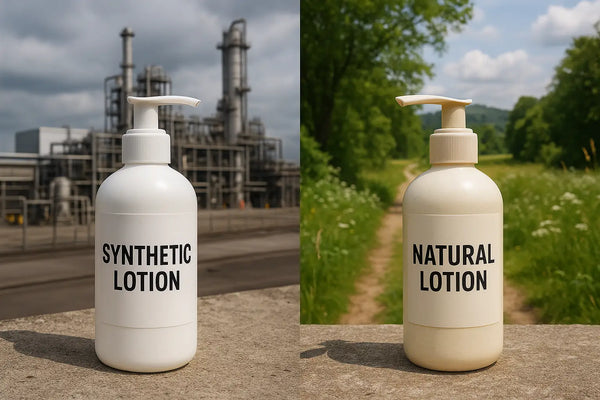Synthetic vs Natural Skincare: What’s the Difference, and Why It Matters
Are you confused about whether synthetic or natural skincare ingredients are better? You're not alone. At Natural Escapes Body, we've helped thousands of customers make the switch to clean, plant-based skincare. This complete guide breaks down the key differences, benefits, and potential risks to help you make informed decisions about your skincare routine.
What Are Synthetic Skincare Ingredients?
Synthetic skincare ingredients are compounds created in a laboratory, often from petrochemicals or other non-natural sources. While they may aim to mimic certain properties found in nature, these ingredients are developed through industrial processes. This allows for specific formulations, but it also means they lack the inherent complexity and synergistic benefits often found in naturally derived ingredients..
Common Synthetic Ingredients in Skincare:
Petroleum-Based Ingredients:
- Mineral Oil - Creates a barrier but can clog pores over time
- Petrolatum - Occlusive ingredient that may trap debris
- Paraffin - Waxy substance that sits on skin surface
Chemical Preservatives:
- Parabens - Extend shelf life but may cause hormone disruption
- Formaldehyde Releasers - Prevent bacterial growth but can irritate sensitive skin
- Phenoxyethanol - Common preservative with potential allergic reactions
Sulfates:
- Sodium Lauryl Sulfate (SLS) - Makes up to 90% of every shampoo or body wash is actually a detergent used in car washes, garage floor cleaners and engine degreasers
- Sodium Laureth Sulfate (SLES) - Milder than SLS but still potentially irritating
Glycols:
- Propylene Glycol - Generally considered safe, even beneficial — though you might want to try it with caution if you have sensitive skin or eczema. Propylene Glycol was named the American Contact Dermatitis Society's Allergen of the year for 2018
- Polyethylene Glycol (PEG) - Helps ingredients penetrate skin
- Butylene Glycol - Solvent and moisture-binding agent
Synthetic Fragrances & Colors:
- Phthalates - Used in fragrances, potential endocrine disruptors
- Artificial Dyes - Can trigger allergic reactions
- Synthetic Fragrances - Common cause of contact dermatitis
Are Synthetic Skincare Ingredients Bad for You?
The Reality: Not all natural ingredients are beneficial and not all synthetic ingredients are necessarily toxic. However, some synthetic ingredients pose concerns:
Potential Issues with Synthetic Skincare:
- Skin Barrier Disruption - Some synthetics can weaken your skin's natural protective barrier
- Temporary Results - Many provide instant gratification but don't address underlying skin health
- Allergic Reactions - Higher risk of sensitivities, especially with fragrances and preservatives
- Hormone Disruption - Certain ingredients like parabens and phthalates may affect hormonal balance
- Dependency Cycle - Skin may become reliant on constant reapplication
- Environmental Concerns - Many synthetic ingredients are not biodegradable
💡 Quick Check: If you find yourself reapplying lotion multiple times a day and your skin still feels dry, you're likely using a product with synthetic fillers that evaporate quickly.
Benefits of Some Synthetic Ingredients:
- Cost-Effective - Generally more affordable to produce and purchase
- Shelf Stability - Synthetic cosmetics almost always have a longer shelf life than their all-natural counterparts due to chemical preservatives
💡 Money-Saving Tip: While synthetic products may cost less upfront, natural products often require less frequent application, making them more economical in the long run.
What Are Natural Skincare Ingredients?
Natural skincare ingredients are derived from plants, minerals, and other naturally occurring sources without synthetic processing.
Powerful Natural Moisturizing Ingredients:
Plant-Based Moisturizers:
- Natural Oils (olive, coconut, avocado, jojoba) - Deliver essential nutrients, vitamins, and fatty acids that penetrate deeply and nourish skin
- Plant-Derived Humectants (vegetable glycerin) - Draw moisture from the environment to keep skin hydrated naturally
Essential Oils for Natural Fragrance:
- Pure Essential Oils (lavender, lemongrass, tea tree, rosemary, eucalyptus, blood orange) - Provide natural aromatherapy benefits without synthetic fragrance chemicals
Botanical Extracts for Skin Benefits:
- Healing Extracts (aloe vera, chamomile, licorice) - Soothe inflammation, calm irritation, and support skin repair naturally
💡 Ingredient Spotlight: Licorice extract is nature's gentle brightener - it helps even skin tone without harsh chemicals like hydroquinone found in synthetic alternatives.
Natural vs Synthetic Skincare: The Key Differences
| Aspect | Natural Skincare | Synthetic Skincare |
|---|---|---|
| Ingredient Source | Plant, mineral, or animal-derived | Lab-created compounds |
| Skin Recognition | Easily recognized by skin | May require adaptation |
| Shelf Life | Shorter, requires careful storage | Longer, more stable |
| Cost | Generally more expensive | Usually more affordable |
| Effectiveness | Works with skin's natural processes | May provide temporary results |
| Side Effects | Lower risk of irritation | Higher risk of allergic reactions |
| Environmental Impact | Often more sustainable | Can be more eco-friendly in production |
Which Is Better: Natural or Synthetic Skincare?
The Answer: It depends on your skin type, concerns, and values. There's no rule saying you can't use both. The key is to make sure all ingredients you use on your skin are safe and effective.
Choose Natural Skincare If You:
- Have sensitive or reactive skin
- Prefer environmentally conscious products
- Want ingredients that work with your skin's natural processes
- Are concerned about potential long-term effects of synthetic chemicals
💡 Transition Tip: If you're switching from synthetic to natural skincare, give your skin 2-4 weeks to adjust. Your skin may need time to rebalance after relying on synthetic ingredients.
Consider Synthetic Skincare If You:
- Need targeted treatment for specific skin concerns
- Want consistent, affordable products
- Prefer longer shelf life and stability
- Are looking for immediate visible results
How to Choose the Right Skincare for You
Read Labels Carefully:
- Look for plant oils in the first 5 ingredients
- Avoid products with long lists of unpronounceable chemicals
- Check for known irritants if you have sensitive skin
- Research any ingredient you're unsure about
Patch Test New Products:
- Apply a small amount to your inner arm
- Wait 24-48 hours to check for reactions
- Start with one new product at a time
Consider Your Skin Type:
- Dry Skin: Focus on natural oils and humectants
- Oily Skin: Look for lightweight, non-comedogenic options
- Sensitive Skin: Prioritize gentle, fragrance-free formulas
- Mature Skin: Consider products with proven anti-aging ingredients
💡 Patch Test Protocol: Apply a small amount of new product to the inside of your wrist or behind your ear. Wait 24-48 hours and check for redness, itching, or irritation before using on your face.
The Bottom Line: Quality Matters Most
Whether you choose natural or synthetic skincare, quality and safety should be your top priorities. Natural skincare products should be free of chemical substances that could irritate the skin or immune system.
Red Flags to Avoid:
- Products with synthetic fragrances if you have sensitive skin
- Extremely cheap moisturizers with mostly water and fillers
- Items with parabens, sulfates, or phthalates if you prefer cleaner formulas
- Products making unrealistic claims
Look for These Quality Indicators:
- Third-party testing and certifications
- Transparent ingredient lists
- Brands with good manufacturing practices
- Positive reviews from people with similar skin types
💡 Label Reading Hack: Ingredients are listed in order of concentration. If beneficial ingredients like plant oils appear after the 10th ingredient, you're getting very little of the good stuff.
Make the Right Choice for Your Skin
The synthetic vs natural skincare debate isn't black and white. The best approach is to:
- Understand your skin's needs and sensitivities
- Research ingredients in products you're considering
- Start slowly with new products
- Listen to your skin and adjust accordingly
- Choose quality over marketing hype
💡 Final Takeaway: Your skin is your body's largest organ. What you put on it matters just as much as what you put in your body. Choose ingredients you can pronounce and trust.
Remember, natural products with high-quality plant-based ingredients will nourish your skin from within and support long-term skin health. Focus on finding products with clean, recognizable ingredients that work with your skin's natural processes.
Ready to make the switch to healthier skincare? Start by reading ingredient labels and prioritizing products with natural, plant-based ingredients that work with your skin's natural processes rather than against them.
Experience the Natural Escapes Difference
At Natural Escapes Body, we craft our moisturizers with high concentrations of nutrient-rich plant oils and botanical extracts—never synthetic fillers, parabens, or harsh chemicals. Our customers consistently tell us they notice softer, more nourished skin that stays hydrated for hours, not minutes.
Shop Our Natural Skincare Collection →
Discover handcrafted, plant-based moisturizers that truly feed your skin from within.
Frequently Asked Questions
Do natural moisturizers work as well as synthetic ones?
Many natural moisturizers can be equally or more effective, especially for long-term skin health. They provide nutrients and work with your skin's natural processes.
Are all synthetic ingredients harmful?
While not every synthetic ingredient will cause immediate harm, many can disrupt your skin's natural barrier, cause sensitivities, or provide only temporary benefits without supporting long-term skin health.
How can I tell if a product is mostly synthetic?
Check the ingredient list. If water, mineral oil, petrolatum, or synthetic preservatives are among the first ingredients, it's likely primarily synthetic.
Do natural products expire faster?
Yes, natural products without synthetic preservatives typically have shorter shelf lives. Always check expiration dates and store properly.
Can I mix natural and synthetic skincare products?
Yes, many people successfully combine both types. Just introduce new products gradually and patch test to avoid reactions.


